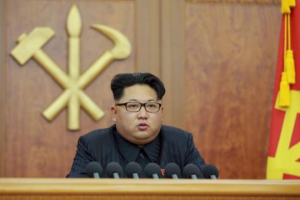While North Korea's alleged successful testing of an H-bomb on Wednesday is met with doubt at the White House, China's foreign ministry spokeswoman, Hua Chunying, was quick to publically rebuke North Korea in their H-bomb pursuit, saying that China, "firmly opposes" the testing and that, " We strongly urge the DPRK side to remain committed to its denuclearisation commitment, and stop taking any actions that would make the situation worse."
China, a North Korean ally, is not pleased that its north-eastern neighbor is claiming to have successfully tested an H-bomb. The testing was close enough to the Chinese border that residents in in the 430,000 trade hub of Yanji reported that desks and tables swayed and that people were evacuated from buildings. Cities in the eastern Jilin province also felt the blast impact. It's believed that the blast happened at 41.3°N 129.10°E, which is roughly 100 kilometers from the China-North Korea border.
The test comes on the heels of a near stock market crash in China on Monday. Financial calamity was averted when Chinese authorities flooded 130bn yuan ($20bn) into the financial system. This was its largest single injection of liquidity since September.
North Korea's Kim Jong-Un didn't waste any time with having Pyongyang news agencies declare that the testing was "successful." China claims that it had no advance notice that there would be an H-bomb testing. There is also some doubt as to whether the explosion was actually in connection to an H-bomb. Some international experts and American officials are saying that the blast was more of the magnitude of an atomic bomb rather than a hydrogen explosion.
China is not alone in condemning the testing. The majority of the international community is on board, and an emergency meeting is taking place in New York among the UN Security Council. North Korea's act has been called, "a very serious provocation," by James Acton, co-director of the nuclear policy program at the Carnegie Endowment for International Peace.
The head of the Comprehensive Nuclear-Test-Ban treaty Organization (CTBTO), Lassina Zebro, said that, "This act constitutes a breach of the universally accepted norm against nuclear testing," and that, "It is also a grave threat to international peace and security."
There have been over 160 countries that have ratified the ban since 1996. There are eight countries that are opposing the enforcement of the ban, two of which are the US and China.
It's not presently clear what action the international community will take in response to North Korea's claims. When North Korea has done bomb testings in the past, it has been met with international sanctions. But this action has not deterred it from continuing to pursue its ambitions.

















